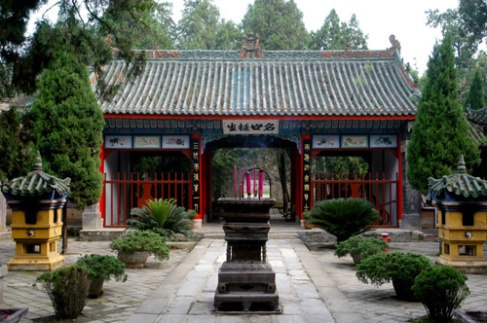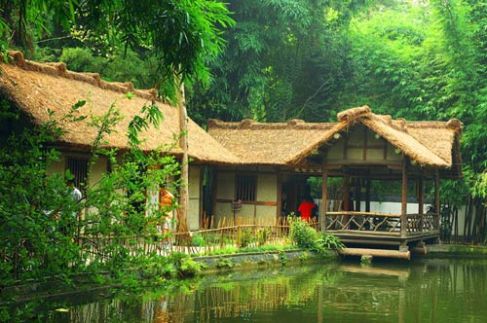If there is one period of Chinese history that everyone seems to know about – thanks to certain novelists, but certainly also to the Japanese game-maker Koei and its unremitting efforts – it seems to be the last decades of the Eastern Han, and the Three Kingdoms Period (184 − 280 AD). This is the era of the Romance of the Three Kingdoms, one of the four Great Novels of Chinese literature (my favourite one, incidentally); but even before that novel was written the period held an enduring fascination for writers.
Of that period, one of the main heroes is of course 诸葛亮 Zhuge Liang (181 − 234 AD), who even now is a byword for genius in Chinese, but was also known for his loyalty. Having helped his lord 刘备 Liu Bei (161 − 223 AD) conquer the lands of Shu, in modern day Sichuan province, he stabilised, administered and defended that state for a decade after Liu Bei’s death, launching repeated Northern Expeditions against the rival state of Wei in an attempt to reunite China. That he eventually died of overwork and illness was seen as a great tragedy, and part of that view was shaped by the poem we are looking at today.
We last talked about poor Du Fu, the long-suffering sage of poetry, who was kicked this way and that during the turbulent years of the An-Shi Rebellion (749 − 756 AD). One of the many places where he eventually settled was Chengdu, the main city of Sichuan; the province was ideal for Liu Bei because of its position, surrounded by mountains and easily defended, and so it was for the Tang court as well. No doubt Du Fu was all too aware of how another era of instability was washing over the empire again, which drove him to commemorate a hero of another chaotic era.
I’ve been to Chengdu, and visited both the Tomb of the Martial Marquess (Zhuge Liang’s tomb) and Du Fu’s Thatched Hut. The Tomb is indeed a quiet park, well managed and densely vegetated, while Du Fu’s supposed house is a lot more of a tourist trap, more like a Qing Dynasty rich man’s house than the refuge of a poet fleeing a long way from home. Still beautiful, though. I’d definitely recommend both places if one visits Chengdu.
Poem
蜀相祠堂何处寻,
Where does one find the Shu Chancellor’s memorial hall?
锦官城外柏森森。
Just outside the Brocade City [1], where the cypresses lushly grow.
映阶碧草自春色,
The verdant grass by the steps are just like any sight of spring,
隔叶黄鹂空好音。
And the orioles flit from leaf to leaf, but here they vainly sing [2].
三顾频烦天下计,
Thrice visited [3] to burden himself with imperial stratagems,
两朝开济老臣心。
Two emperors [4] to labour for, and a whole state to maintain.
出师未捷身先死,
To die on expedition while victory was already near [5] –
长使英雄泪满襟。
The thought alone has stained many a hero’s lapels with tears.
1 – Brocade City – A nickname for Chengdu, which has had a long reputation for silk cultivation and manufacture; a thousand years after this poem was written, ‘Sichuan Brocade’ was still considered a high quality good.
2 – The two lines seem dismissive of the scenery, which is intended – Du Fu visited not to look at grass and listen to orioles; he was at the tomb to pay his respects to a personal hero.
3 – The three visits refer to how Liu Bei recruited Zhuge Liang, visiting him thrice at his hovel in the middle of nowhere. Which is pretty touching, as a HR policy goes.
4 – The two emperors were respectively Liu Bei (r. 221 – 223) and 刘禅 Liu Shan (r. 223 – 263).
5 – Zhuge Liang died of overwork on one of his expeditions, having pursued the Wei armies to the battlefield of Wuzhang Plains and held them at an impasse.


Pingback: Vacant Mountain 空山 | 蒿里行 – Marching amid Wormwood
Pingback: Vacant Mountain 空山 | 古柏行 – On the Ancient Cypress